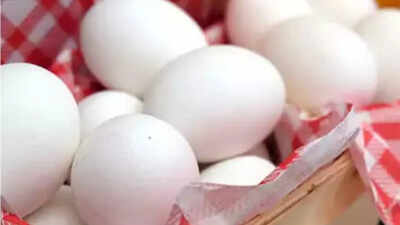- News
- City News
- bengaluru News
- Eggs in midday meals for 100 days this academic year in Karnataka?
Trending Topics
Eggs in midday meals for 100 days this academic year in Karnataka?

Representative image
BENGALURU: The Karnataka education department is planning to extend the scheme of giving eggs to students as part of midday meals from 46 days to 100 days in an academic year, besides rolling out the scheme to students of classes 9 and 10 as well. The scheme is now only for class 1-8 children.
The newly sworn-in Congress government will have to take a call on this key proposal sent in by the department, an officer said.
Serving of eggs in the midday meals has been a bone of contention with religious outfits opposing it despite educationists and nutritionists highlighting its benefits. Eggs were initially introduced in the Kalyana-Karnataka region to fight malnutrition. The programme was funded by the Centre.
Later, it was extended to all districts of the state.
With agencies like Iskcon and Adamya Chetana refusing to serve eggs in schools where they provide the food, the government asked schools to procure eggs. Children who do not eat eggs can opt for bananas or chikkis.
Some schools recently flagged the rising costs of eggs and the budget does not match up to it. The education department had initiated a study to understand the impact of providing eggs to the children. The study by Karnataka State Rural Development and Panchayat Raj University found the scheme had a positive impact on children in Yadgir district as opposed to Gadag, where eggs were not given. The attendance in these schools had also improved, the education department said.
The official said students will get midday meals from Wednesday when schools reopen after the two-month summer break. Due to shortage in milk production, many schools, especially in the Kalyana-Karnataka region, had not received regular supply of milk powder from Karnataka Milk Federation earlier this year.
"We had ordered milk powder for June and July. In many taluks, the supply for June has arrived, even though our full requirement has not been met. There is no immediate concern about the milk supply," the official said.
The newly sworn-in Congress government will have to take a call on this key proposal sent in by the department, an officer said.
Serving of eggs in the midday meals has been a bone of contention with religious outfits opposing it despite educationists and nutritionists highlighting its benefits. Eggs were initially introduced in the Kalyana-Karnataka region to fight malnutrition. The programme was funded by the Centre.
Later, it was extended to all districts of the state.
With agencies like Iskcon and Adamya Chetana refusing to serve eggs in schools where they provide the food, the government asked schools to procure eggs. Children who do not eat eggs can opt for bananas or chikkis.
Some schools recently flagged the rising costs of eggs and the budget does not match up to it. The education department had initiated a study to understand the impact of providing eggs to the children. The study by Karnataka State Rural Development and Panchayat Raj University found the scheme had a positive impact on children in Yadgir district as opposed to Gadag, where eggs were not given. The attendance in these schools had also improved, the education department said.
The official said students will get midday meals from Wednesday when schools reopen after the two-month summer break. Due to shortage in milk production, many schools, especially in the Kalyana-Karnataka region, had not received regular supply of milk powder from Karnataka Milk Federation earlier this year.
"We had ordered milk powder for June and July. In many taluks, the supply for June has arrived, even though our full requirement has not been met. There is no immediate concern about the milk supply," the official said.
Start a Conversation
FOLLOW US ON SOCIAL MEDIA
FacebookTwitterInstagramKOO APPYOUTUBE







